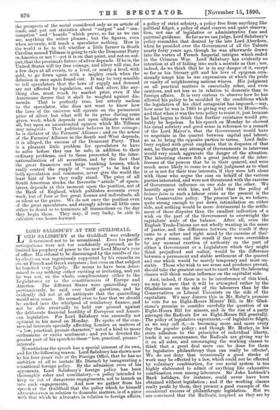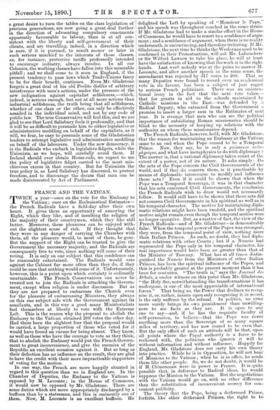LORD SALISBURY AT THE GUILDHALL.
TORD SALISBURY at the Guildhall was evidently determined not to be sensational. Even his pacific anticipations were not too confidently expressed, as he limited his prophecy of peace to the new Lord Mayor's year of office. His refusal to be discouraged by the results of the by-elections was ingeniously supported by his remarks on recant French and Greek surprises ; but even on that subject he touched very lightly. He seems to have been deter- mined to say nothing either exciting or irritating, and yet he was not, on the whole, complimentary either to the Legislatures or to the constituencies of Europe and America. The different States were quarrelling very pertinaciously, he said, over tariff questions, and he evidently did not at all anticipate that the quarrelling would soon cease. He seemed even to fear that we should b3 sucked into the whirlpool of retaliatory finance, and not be able eventually to hold our ground against the deliberate financial hostility of European and Ameri- can legislation. For Lord Salisbury was assuredly not optimist in his mood on Monday. He spoke of the com- mercial interests specially affecting London as matters of " a low, practical, prosaic character," not of a kind to move -enthusiasm or excite sentiment ; and yet he devoted the greater part of his speech to these " low, practical, prosaic " interests.
Nevertheless the speech has a special interest of its own, and for the following reason. Lord Salisbury has shown now by his four years' rule at the Foreign Office, that he has no ambition at all to imitate Mr. Disraeli by inaugurating a sensational foreign policy. By the admission even of his opponents, Lord Salisbury's foreign policy has been thoroughly sober and conciliatory,—a policy intended to keep us out of dangerous engagements, not to launch us into such engagements. And now we gather from his speech at the Guildhall that the policy which he himself advocates even in relation to domestic matters, is of a piece with that which he advocates in relation to foreign affairs, a policy of strict sobriety, a policy free from•anything like political fidget, a policy of staid reserve and quiet observa- tion, not one of legislative or administrative fuss and paternal guidance. So far as we can judge, Lord Salisbury's policy resembles that desired by the late Lord Aberdeen, when he presided over the Government of all the Talents nearly forty years ago, though he was afterwards drawn into the vortex of French Imperial intrigue which ended in the Crimean War. Lord Salisbury has evidently no intention at all of falling into such a mistake as that ; nor, indeed, do we think that he is in any danger of it, except so far as his literary gift and his love of epigram occa- sionally tempt him to use expressions at which the pride or vanity of neighbouring nations winces. His judgment on all practical matters is essentially sober, and even cautious, and not less so in relation to domestic than to foreign affairs. It is very curious to observe how he has allowed his policy to be moulded by the conditions which the legislation of his chief antagonist has imposed,—nay, how near he was in 1885 to giving way even to Home-rule, and that when it was the true policy to resist it, just because he had begun to think that further resistance would pro- bably be hopeless. In his speech on Monday he showed his usual sobriety and good sense in reference to a remark of the Lord Mayor's, that the Government would have to negotiate in the quarrel between capital and labour, so as to bring the opposite parties to terms. Lord Salis- bury replied with great emphasis that in disputes of that sort, he thought any attempt of Governments to intervene would very much aggravate the danger of the situation. The labouring classes felt a great jealousy of the inter- ference of the powers that be in their quarrel, and were much more likely to come to a right judgment as to what is or is not for their true interests, if they were left alone with those who argue the case on behalf of the various parties interested, and were not threatened with the exercise of Government influence on one side or the other. We heartily agree with him, and hold that the policy of laisser faire in such a labour crisis as the present is the true Conservative policy. The present law is, we believe, quite strong enough to put down intimidation on either side, and nothing would be more detrimental to the settle- ment of these disputes than the smallest indication of a wish on the part of the Government to overweight the capitalists' scale of the balance. After all, even the English Trade-Unions are not wholly wanting in the sense of justice, and the difference between the result if they came to a sober and right mind by the exercise of thei- own good sense, and the result if they were overridden by any unusual exertion of authority on the part of either a Government or a Legislature which they might think prejudiced and unfair, would be the difference between a permanent and stable settlement of the quarrel and one which would be merely temporary and most un- stable. Those who wish to see sense and prudence prevail, should take the greatest care not to exert what the labouring classes will think undue influence on the capitalist side.
And, indeed, if there is to be interference of this kind, we may be sure that it will be attempted rather by the Gladstonians on the side of the labourers than by the Conservatives or Liberal Unionists on the side of the capitalists. We may discern this in Mr. Roby's promise to vote for an Eight-Hours Miners' Bill, in Mr. Glad- stone's promise to consider carefully the question of an Eight-Hours Bill for miners, and in the rise of a party amongst the Radicals for an Eight-Hours Bill generally. The policy of legislative experiment,—of legislative fidget, as we may call it,—is becoming more and more every day the popular policy ; and though Mr. Morley, in his stern adhesion to the principles of individual liberty, lends it no countenance, the Radicals are giving way to it on all sides, and encouraging the working classes to think that a great 'deal more can be done for them by legislative philanthropy than can really be effected. We do not deny that occasionally a good stroke of work may be effected by a law, which could not be effected by voluntary combination, for our social system is too highly elaborated to admit of anything like exhaustive combination even among labourers. Sir John Lubbock's Bank holidays, for instance, could never have been obtained without legislation ; and if the working classes really profit by them, they present a good example of the occasional success of philanthropic legislation. But we are convinced that the Radicals, inspired as they are by a great desire to turn the tables on the class legislation of previous generations, are now going a great deal further in the direction of advocating compulsory enactments apparently favourable to labour, than is at all con- sistent with the liberty and self-government of their clients, and are travelling, indeed, in a direction which is sure, if it is pursued, to result sooner or later in such serious mischief to the interests of those classes, as, for instance, protective tariffs professedly intended to encourage industry, always involve. In all our Colonies, the working classes have fallen into this miserable pitfall ; and we shall come to it soon in England, if the present tendency to pass laws which Trade-Unions fancy to be for their benefit, continues. Even Mr. Gladstone forgets a great deal of his old Peelite dislike of arbitrary interference with men's actions, under the pressure of the new indignation against capitalist selfishness,—which, indeed, is serious enough, but not at all more serious than industrial selfishness, the truth being that all selfishness, whether of one class or the other, can only be effectively assailed in the individual mind, and not by any code of public law. The true Conservative will feel this, and we are glad to see that Lord Salisbury feels it profoundly, and that it will be as difficult to persuade him to either legislative or administrative meddling on behalf of the capitalists, as it will, we fear, be easy to persuade some of the Gladstonian leaders to attempt legislative and administrative meddling on behalf of the labourers. Under the new democracy, it is the Radicals who embark in legislative fidgets, while the Unionists, as we hope, will carefully avoid them. If Ireland should ever obtain Home-rule, we expect to see the policy of legislative fidget carried to the most mis- chievous excess in that country. But for Unionists the true policy is, as Lord Salisbury has discerned, to protect freedom, and to discourage the dream that man can be made disinterested by Act of Parliament.



















































 Previous page
Previous page